-
ORIGINAL ARTICLE08-07-2023
Sense of coherence and social support as predictors of mental health during COVID-19 pandemic
Revista Brasileira de Enfermagem. 2023;76:e20220468
Abstract
ORIGINAL ARTICLESense of coherence and social support as predictors of mental health during COVID-19 pandemic
Revista Brasileira de Enfermagem. 2023;76:e20220468
DOI 10.1590/0034-7167-2022-0468
Views0See moreABSTRACT
Objectives:
to verify the role of sense of coherence, sense of national coherence, social support and trust in institutions to predict mental health in Brazilians during the COVID-19 pandemic.
Methods:
a cross-sectional study, carried out from November, 2020 to January, 2021 via an online survey. Standardized instruments were used. The sample consisted of 1,630 Brazilians. Pearson’s correlation and linear regression were performed in data analysis.
Results:
sense of coherence was the only predictor of anxiety [β= -0.61; p<0.001], explaining 38% of the variance in its scores, while sense of coherence [β= 0.52; p<0.001], sense of national coherence [β= 0.16; p<0.001], and social support [β= 0.15; p<0.001] predicted positive mental health and together explained 51% of its variance.
Conclusions:
the findings suggest that sense of coherence, sense of national coherence and social support represent important predictors for mental health and that strengthening these resources, could potentially promote Brazilians’ mental health.
-
ORIGINAL ARTICLE08-07-2023
Factors associated with the time to treat breast cancer in the pandemic period: an observational study
Revista Brasileira de Enfermagem. 2023;76:e20220428
Abstract
ORIGINAL ARTICLEFactors associated with the time to treat breast cancer in the pandemic period: an observational study
Revista Brasileira de Enfermagem. 2023;76:e20220428
DOI 10.1590/0034-7167-2022-0428
Views0See moreABSTRACT
Objectives:
to analyze the factors associated with the time to surgical treatment for breast cancer in patients seen at a reference mastology outpatient clinic in the State of Ceará.
Methods:
analytical, longitudinal study with medical charts from the Mastology Outpatient Clinic of Assis Chateaubriand Maternity School. We used 140 medical charts of breast cancer patients with surgeries performed during the pandemic.
Results:
the study evidenced associations between schooling and shorter time to treatment in patients who underwent biopsy before the first outpatient visit (p = 0.026; OR: 0.16; CI = 0.03-0.85); in the group who had the biopsy performed by the outpatient clinic, was associated the type of tumor (p = 0.019) and neoadjuvant therapy (p = 0.000).
Conclusions:
the lesser educational level, tumor type, and use of neoadjuvant therapy were factors associated with the time to treatment during the pandemic period.
-
ORIGINAL ARTICLE08-07-2023
Conhecimento e atitude dos estudantes de enfermagem em relação ao comportamento de prevenção à COVID-19
Revista Brasileira de Enfermagem. 2023;76:e20220588
Abstract
ORIGINAL ARTICLEConhecimento e atitude dos estudantes de enfermagem em relação ao comportamento de prevenção à COVID-19
Revista Brasileira de Enfermagem. 2023;76:e20220588
DOI 10.1590/0034-7167-2022-0588
Views0See moreRESUMEN
Objetivos:
determinar la correlación entre el nivel de conocimiento y las actitudes de los estudiantes de enfermería en relación a la conducta de prevención de la COVID-19.
Métodos:
estudio transversal realizado en una Universidad Privada de Indonesia. Se utilizó un muestreo accidental para seleccionar a 188 estudiantes de tercer año de enfermería como encuestados. La recolección de datos se realizó mediante un cuestionario en línea que consta de 27 preguntas (alfa de Cronbach 0.799-0.959). Los datos fueron analizados de forma descriptiva e inferencial.
Resultados:
el 49,5 % de los encuestados tenía conocimientos altos, el 98,4 % tenía una actitud positiva y el 89,9 % tenía un comportamiento positivo en la prevención de la transmisión de la COVID-19. La prueba de Chi-cuadrado reveló que el conocimiento no tiene correlación con el comportamiento de prevención de COVID-19 (valor de p 0,864), pero la actitud sí (valor de p 0,027).
Conclusiones:
las actitudes de los estudiantes de enfermería están relacionadas con el comportamiento en la prevención del COVID-19. Se espera que los estudiantes de enfermería mantengan actitudes y comportamientos positivos hacia la prevención de COVID-19 como futuros profesionales de la salud en la primera línea de los servicios de salud.
-
ORIGINAL ARTICLE08-07-2023
Senso de coerência e apoio social como preditores de saúde mental durante a pandemia de COVID-19
Revista Brasileira de Enfermagem. 2023;76:e20220468
Abstract
ORIGINAL ARTICLESenso de coerência e apoio social como preditores de saúde mental durante a pandemia de COVID-19
Revista Brasileira de Enfermagem. 2023;76:e20220468
DOI 10.1590/0034-7167-2022-0468
Views0See moreRESUMEN
Objetivos:
verificar el papel del sentido de coherencia, sentido de coherencia nacional, apoyo social y confianza en las instituciones como predictores de salud mental en brasileños durante la pandemia de COVID-19.
Métodos:
estudio transversal, realizado de noviembre de 2020 a enero de 2021 mediante cuestionario online. Se utilizaron instrumentos estandarizados. La muestra estuvo compuesta por 1.630 brasileños. En el análisis de datos se realizaron correlación de Pearson y regresión lineal.
Resultados:
el sentido de coherencia fue el único predictor de ansiedad [β= -0,61;p<0,001], explicando el 38% de la variación de sus puntuaciones, mientras que el sentido de coherencia [β=0,52;p<0,001], sentido de coherencia nacional [β= 0,16;p<0,001] y apoyo social [β=0,15;p<0,001] fueron predictores de salud mental positiva y en conjunto explicaron el 51% de su variación.
Conclusiones:
los hallazgos sugieren que sentido de coherencia, sentido de coherencia nacional y el apoyo social representan importantes predictores de salud mental y que el fortalecimiento de estos recursos, podría potencialmente promover la salud mental de los brasileños.
-
ORIGINAL ARTICLE07-31-2023
Primary Health Care assessment in the COVID-19 pandemic from physicians’ and nurses’ perspective
Revista Brasileira de Enfermagem. 2023;76:e20220475
Abstract
ORIGINAL ARTICLEPrimary Health Care assessment in the COVID-19 pandemic from physicians’ and nurses’ perspective
Revista Brasileira de Enfermagem. 2023;76:e20220475
DOI 10.1590/0034-7167-2022-0475
Views0ABSTRACT
Objectives:
to assess the operationalization of Primary Health Care in the COVID-19 pandemic, according to Primary Care Assessment Tool: PCATool-Brasil attributes, from physicians’ and nurses’ perspective.
Methods:
a cross-sectional study, carried out with 99 physicians and nurses from Basic Health Units in a state in northeastern Brazil, with the aid of the adapted instrument PCATool-Brasil.
Results:
Essential Score was classified as high performance (6.6) and General Score as low performance (6.5). First Contact Access, Care Integration, and Community Guidance scores were <6.6. The best performances were attributed to the Longitudinality, Comprehensiveness and Family Guidance services (scores>6.6).
Conclusions:
the attributes of Primary Health Care, in general, showed values above or close to the cut-off point in the assessment. These data can support strategies for local and national managers to strengthen Primary Health Care in the COVID-19 pandemic and future public health emergencies.
Keywords:COVID-19Health Care Evaluation MechanismsHealth PersonnelHealth Services ResearchPrimary Health CareSee more -
EDITORIAL07-31-2023
First graduate of the Master of Nursing in Advanced Practice in Oncology in Chile
Revista Brasileira de Enfermagem. 2023;76:e76suppl401
Abstract
EDITORIALFirst graduate of the Master of Nursing in Advanced Practice in Oncology in Chile
Revista Brasileira de Enfermagem. 2023;76:e76suppl401
DOI 10.1590/0034-7167.202376suppl401
Views0In 2020, the guidelines for Advanced Nursing Practice (APN) implementation() were published by the International Council of Nursing (ICN). On that occasion, I was invited to comment on the reality of specialist nurses in Chile, expressing the expectation of implementing an APN program, specifically Clinical Nurse Specialists (CNS). CNS are one of the most internationally […]See more
-
ORIGINAL ARTICLE09-24-2022
Nurses’ performance in palliative care: spiritual care in the light of Theory of Human Caring
Revista Brasileira de Enfermagem. 2022;75(1):e20210029
Abstract
ORIGINAL ARTICLENurses’ performance in palliative care: spiritual care in the light of Theory of Human Caring
Revista Brasileira de Enfermagem. 2022;75(1):e20210029
DOI 10.1590/0034-7167-2021-0029
Views1See moreABSTRACT
Objectives:
to analyze nurses’ role in assisting patients in palliative care, with emphasis on the spiritual dimension, in the light of Theory of Human Caring.
Methods:
this is an exploratory, qualitative study, carried out in a hospital in João Pessoa, Paraíba, between August and December 2019, with 10 nurses. For data collection, semi-structured interviews were used. For analysis, we opted for content analysis.
Results:
the spiritual dimension of care is contemplated by several religious and spiritual practices. These are respected and encouraged by nurses, although there is difficulty in providing care for the spiritual dimension.
Final Considerations:
nurses have attitudes consistent with Jean Watson’s Theory and apply the Caritas Process elements during assistance to patients’ spiritual dimension in palliative care.
-
ERRATUM01-15-2024
ERRATUM
Revista Brasileira de Enfermagem. 2024;77(1):e2024n1e01
Abstract
ERRATUMERRATUM
Revista Brasileira de Enfermagem. 2024;77(1):e2024n1e01
DOI 10.1590/0034-7167.20247701e01
Views1In the article “The ethics of nursing care for transgender people”, with DOI number: , published in Revista Brasileira de Enfermagem, 2023;76(Suppl 3):e20220797, in authorship:Where it read:[…]See more -
ORIGINAL ARTICLE04-14-2023
Guide for Systematization of Care and Nursing Process: educational technology for professional practice
Revista Brasileira de Enfermagem. 2023;76:e20210975
Abstract
ORIGINAL ARTICLEGuide for Systematization of Care and Nursing Process: educational technology for professional practice
Revista Brasileira de Enfermagem. 2023;76:e20210975
DOI 10.1590/0034-7167-2021-0975
Views1ABSTRACT
Objective:
to elaborate and validate the content of a digital guide educational technology on Systematization of Nursing Care and Nursing Process.
Methods:
applied research of technological development, developed between 2020 and 2021, in three steps. First, a scoping review was carried out to elaborate the content. In the second step, the content was validated with 46 nurse judges selected for convenience. The minimum criterion of agreement among judges was 80%. The third step consisted of content organization and layout.
Results:
the guide content was elaborated from the Federal Nursing Council legislation, scientific articles and textbooks. Content was considered appropriate, relevant and organized by judges.
Final considerations:
the digital guide is an alternative that can contribute to the NP execution and implementation, supporting the planning and implementation of actions for quality of care.
Keywords:Educational TechnologyNursing ProcessNursing RecordsProfessional PracticeStandardized Nursing TerminologySee more
-
ORIGINAL ARTICLE03-27-2023
Adaptation and validation of an adult patient classification instrument with emphasis on the family dimension
Revista Brasileira de Enfermagem. 2023;76(2):e20220530
Abstract
ORIGINAL ARTICLEAdaptation and validation of an adult patient classification instrument with emphasis on the family dimension
Revista Brasileira de Enfermagem. 2023;76(2):e20220530
DOI 10.1590/0034-7167-2022-0530
Views1ABSTRACT
Objectives:
to adapt and validate an instrument for classifying adult patients that emphasizes the family support network in the demand for nursing care.
Methods:
methodological study, carried out in three phases: adaptation of an instrument considering the reality of adult patients; content validation with seven experts and assessment of measurement properties (construct validity and internal consistency) with 781 hospitalized patients.
Results:
in content validation, the indicators reached the values established for the Content Validity Index (0.85-1.00). In the confirmatory factor analysis, the 11 indicators were distributed in three domains and presented average variance extracted and factor loading greater than 0.5. Composite reliability was greater than 0.7.
Conclusions:
the present study adapted and made available, with evidence of validity and reliability, an instrument for classifying adult patients that considers the family support network in the demand for nursing care.
Keywords:Factor AnalysisFamilyHospital Organization and AdministrationPatient-Centered CareValidation StudiesSee more
-
ORIGINAL ARTICLE10-17-2022
Ethics, COVID-19 and nursing vulnerability: analysis of photographs released by the media
Revista Brasileira de Enfermagem. 2022;75:e20210960
Abstract
ORIGINAL ARTICLEEthics, COVID-19 and nursing vulnerability: analysis of photographs released by the media
Revista Brasileira de Enfermagem. 2022;75:e20210960
DOI 10.1590/0034-7167-2021-0960
Views1See moreABSTRACT
Objectives:
to analyze nursing vulnerability through photos released by the media amidst the COVID-19 pandemic.
Methods:
a documentary study, with a qualitative approach. The object of analysis were photographic images selected between January 2020 and March 2021, published by the main news portals in countries such as Brazil, the United States, France, Spain, England and Germany. Thematic categorical analysis was the method of analysis used.
Results:
we found 74 photographs that portrayed nursing professionals in different work situations. It was possible to identify stigma and social devaluation about this class’s representation and professional attribution. Moreover, we found an underrepresentation of black professionals in Brazilian portals and the man as the prominent figure in the spaces of claims.
Final Considerations:
the photographs represented an important tool for the social analysis of nursing vulnerability, favoring the unveiling of situations that may go unnoticed by nursing and society.
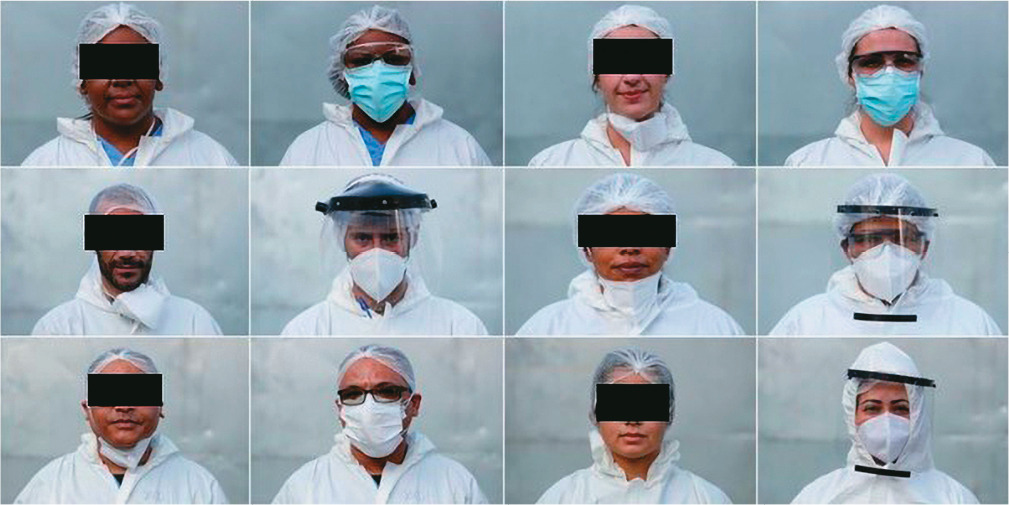
-
TECHNOLOGICAL INNOVATION09-01-2021
Nursing APHMÓVEL: mobile application to register the nursing process in prehospital emergency care
Revista Brasileira de Enfermagem. 2021;74:e20201029
Abstract
TECHNOLOGICAL INNOVATIONNursing APHMÓVEL: mobile application to register the nursing process in prehospital emergency care
Revista Brasileira de Enfermagem. 2021;74:e20201029
DOI 10.1590/0034-7167-2020-1029
Views1ABSTRACT
Objectives:
to develop an application for a mobile device for the registration of the Nursing Process by nurses of the Mobile Emergency Care Service.
Methods:
applied research with technology development based on software engineering and Apple’s Human Interface Guidelines. It had the support of an application developer and a designer. The proposal was built in four steps (scope definition, planning, prototype creation and development).
Results:
the application “Nursing APHMóvel” allows to record the steps of the Nursing Process, such as history, nursing diagnoses, outcomes and interventions with the possibility of storing the data and/or file in printable format. The technological innovation has location features, scales with automatic sum of items, touchscreen, and offline operation.
Conclusions:
it was possible to develop the application with the potential for computerized documentation of the Nursing Process by nurses working in the Mobile Emergency Care Service.
Keywords:Electronic Health RecordsInformation TechnologyMobile ApplicationsNursing ProcessPrehospital CareSee more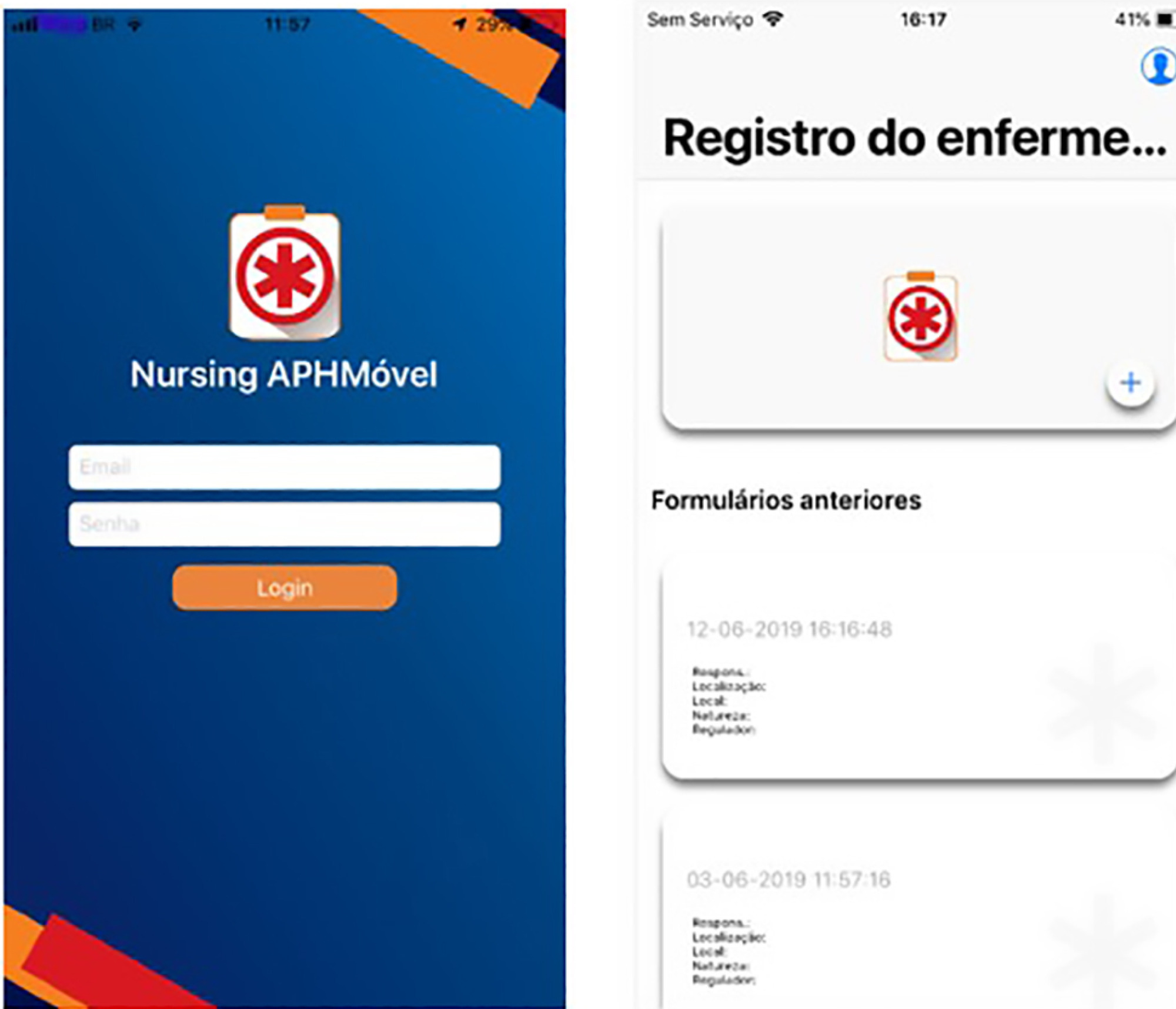
-
Evolution of nursing teaching in the use of education technology: a scoping review
Revista Brasileira de Enfermagem. 2021;74:e20200422
Abstract
Evolution of nursing teaching in the use of education technology: a scoping review
Revista Brasileira de Enfermagem. 2021;74:e20200422
DOI 10.1590/0034-7167-2020-0422
Views1See moreABSTRACT
Objective:
To identify and map the technological tools of information and communication to support the teaching learning process in Nursing teaching courses.
Methods:
This is a scoping review whose search was carried out in seven databases and in grey literature. After an initial analysis of the selection, 88 texts were read integrally, and 29 made up the final sample.
Results:
Virtual learning environment and object, simulation, hypermedia, and software or cellphone applications were the tools the nursing professors used the most. Studies highlight that the application of technology was important in the teaching-learning process, since it encouraged teaching based on safe care, motivating and developing abilities/competences, supported on significant, effective, flexible, and autonomous learning.
Conclusion:
The contribution of the technology for nursing formation stands out, but it should be highlighted that its employment must be critical, reflective, based on pedagogical theories and developed by trained professors.

-
ORIGINAL ARTICLE06-14-2024
Validity of the TBApp mobile application for self-care management for people with tuberculosis
Revista Brasileira de Enfermagem. 2024;77(2):e20230195
Abstract
ORIGINAL ARTICLEValidity of the TBApp mobile application for self-care management for people with tuberculosis
Revista Brasileira de Enfermagem. 2024;77(2):e20230195
DOI 10.1590/0034-7167-2023-0195
Views1See moreABSTRACT
Objectives:
to describe the validity process of the TBApp mobile application for self-care management for people with tuberculosis linked to Primary Health Care.
Methods:
methodological research developed with ten expert judges, carried out virtually. The application was assessed in relation to content and technology quality in seven domains (objectivity; structure and appearance; relevance; functionality; reliability; usability; and efficiency), using an instrument with a Likert scale.
Results:
TBApp was considered valid, relevant, functional, reliable and effective by expert judges. The objectives, structure and presentation and relevance domains presented an overall Content Validity Index of 0.93, and the functionality, reliability, usability and efficiency domains presented characteristics and sub-characteristics values greater than 0.80.
Conclusions:
TBApp is a creative and innovative tool that can be used by people with TB and disseminated in the scientific community.
-
REVIEW06-11-2021
Mental health interventions implemented in the COVID-19 pandemic: what is the evidence?
Revista Brasileira de Enfermagem. 2021;74:e20200635
Abstract
REVIEWMental health interventions implemented in the COVID-19 pandemic: what is the evidence?
Revista Brasileira de Enfermagem. 2021;74:e20200635
DOI 10.1590/0034-7167-2020-0635
Views0See moreABSTRACT
Objective:
to map the evidence on mental health interventions implemented during the COVID-19 pandemic.
Method:
this scoping review was carried out in the MEDLINE/PubMed, SCOPUS, Web of Science, PsycINFO, and Science Direct databases and in the medRxiv, bioRxiv, and PsyArXiv preprints servers using the descriptors “Covid-19”, “coronavirus infection”, “coronavirus”, “2019-nCoV”, “2019 novel coronavirus disease”, “SARS-CoV-2”, “health personnel”, “general public”, and “mental health”.
Results:
eight articles were selected and categorized into mental health interventions for the population, among which mental health interventions were for people diagnosed with suspicion/confirmed COVID-19 and mental health interventions for health professionals.
Conclusion:
telemonitoring, virtual games and strategies focused on social support and muscle relaxation techniques, characterized as non-pharmacological and low-cost, were shown as interventions, which, since they are effective, need to be encouraged and included in mental health care practices.

-
Nursing performance in robotic surgeries: integrative review
Revista Brasileira de Enfermagem. 2019;72(3):795-800
Abstract
Nursing performance in robotic surgeries: integrative review
Revista Brasileira de Enfermagem. 2019;72(3):795-800
DOI 10.1590/0034-7167-2018-0426
Views0ABSTRACT
Objective:
To know the scientific production on the performance of the nursing staff in robotic surgeries, identifying the role of the nurse in the three perioperative periods.
Methods:
Integrative review, search in the databases National Library of Medicine, National Institutes of Health, Scientific Electronic Library Online and Biblioteca Virtual em Saúde, performed from June to September, 2017; 17 selected articles met the inclusion criteria.
Results:
Most articles were published in foreign journals in English, nine in the United States, classified with evidence level of 4 and 5. The role of nursing in the perioperative period was identified, related mainly to patient safety. The most mentioned perioperative period in the articles was the intraoperative, with greater concern in the positioning of the patient.
Conclusion:
The nursing performance and patient safety in robotic surgeries are similar to the ones in major surgeries, requiring from the patient a specific knowledge on the setting and preparation of the robot.
Keywords:Nurse's RolePerioperative NursingRoboticsSurgical Procedures, OperativeTechnological DevelopmentSee more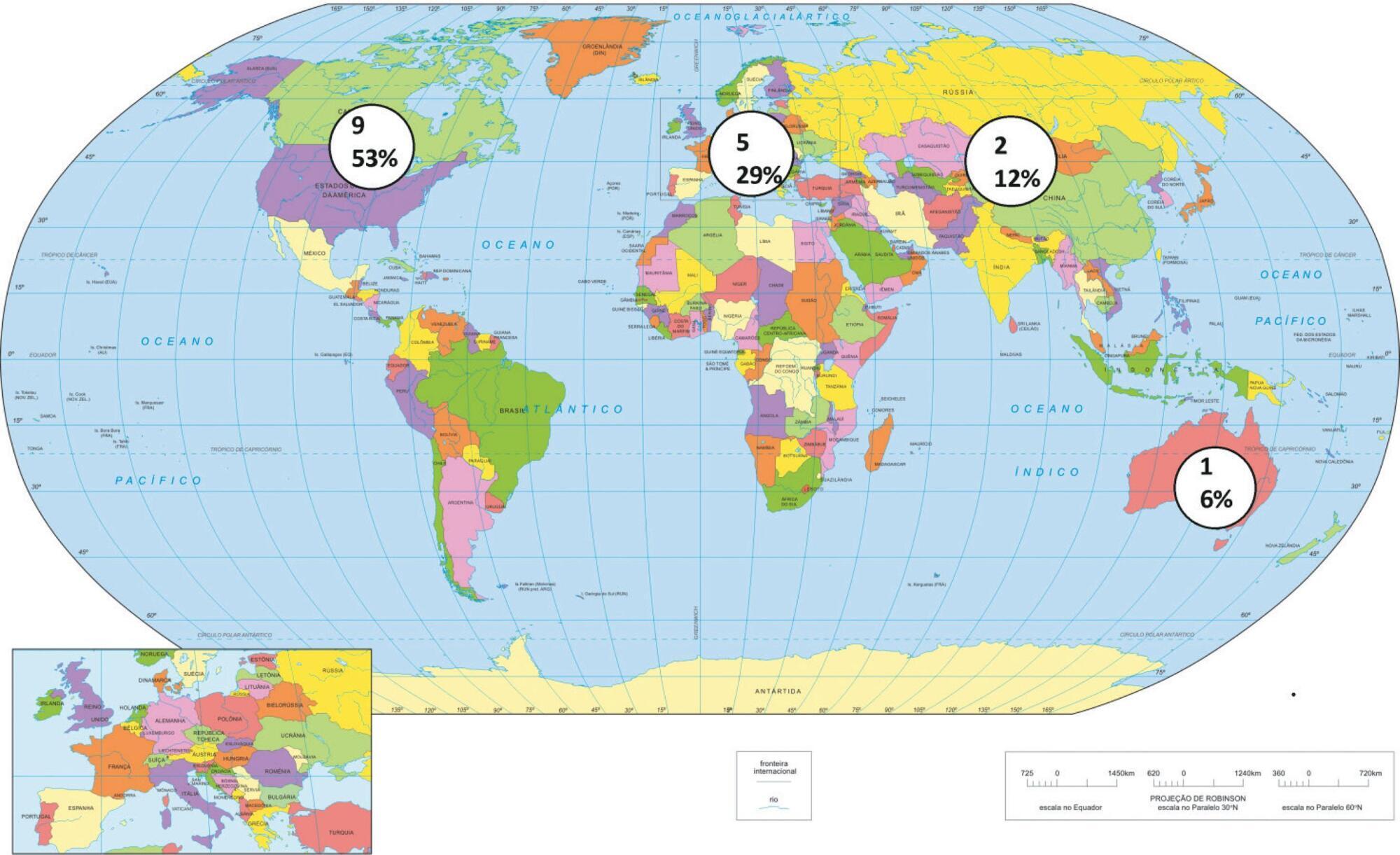
-
ORIGINAL ARTICLE10-21-2019
“Waiting for a miracle”: Spirituality/Religiosity in coping with sickle cell disease
Revista Brasileira de Enfermagem. 2019;72(6):1554-1561
Abstract
ORIGINAL ARTICLE“Waiting for a miracle”: Spirituality/Religiosity in coping with sickle cell disease
Revista Brasileira de Enfermagem. 2019;72(6):1554-1561
DOI 10.1590/0034-7167-2018-0635
Views0See moreABSTRACT
Objective:
To understand spirituality/religiosity as experienced by people with sickle cell disease, and its influence on coping with the disease.
Method:
A qualitative, descriptive, and exploratory study conducted in the State of Bahia. Twenty-nine respondents participated in semi-structured interviews. Content analysis was used to analyze the empirical material.
Results:
Individuals with sickle cell disease experience spirituality/religiosity motivated by their hope for a miracle, and fear of death; among their rites are: reading religious materials, individual and group prayer, and attendance at worship services. The effects on their health include: comfort by means of coping by comparing two evils, anxiety relief, social support, and lifestyle changes; however, spirituality/religiosity may be impaired.
Final considerations:
This study demonstrates the need to qualify health professionals to address spiritual issues of these individuals during illness, with the aims of diagnosing suffering and anguish, and providing care, comfort and strengthening of the spiritual bonds of these individuals.
-
ORIGINAL ARTICLE12-21-2020
Construction and validation of a mobile application for development of nursing history and diagnosis
Revista Brasileira de Enfermagem. 2020;73:e20190674
Abstract
ORIGINAL ARTICLEConstruction and validation of a mobile application for development of nursing history and diagnosis
Revista Brasileira de Enfermagem. 2020;73:e20190674
DOI 10.1590/0034-7167-2019-0674
Views0ABSTRACT
Objectives:
to describe the construction and validation process for a mobile application for development of the nursing history and diagnosis.
Methods:
methodological study conducted in 2018 in three stages: content creation, based on the Basic Human Needs categories and nursing diagnoses; content assessment by nine nursing judges, with calculation of the content validity index; and construction of the application, which included definition of the requirements, a conceptual map, implementation and prototyping options, tests and implementation.
Results:
the application was organized by sections: Grouped Basic Human Needs, Cranial pair tests, Clinical assessment scales and Additional tests. Two section were adjusted according to the judges’ suggestions.
Final Considerations:
it is the first application produced in Brazil based on the Basic Human Need categories, which enables quick access to information, concepts and typical nomenclatures of semiology, recording of clinical data and definition of nursing diagnoses.
Keywords:Educational TechnologyMobile ApplicationsNursing InformaticsNursing ProcessPhysical ExaminationSmartphoneSee more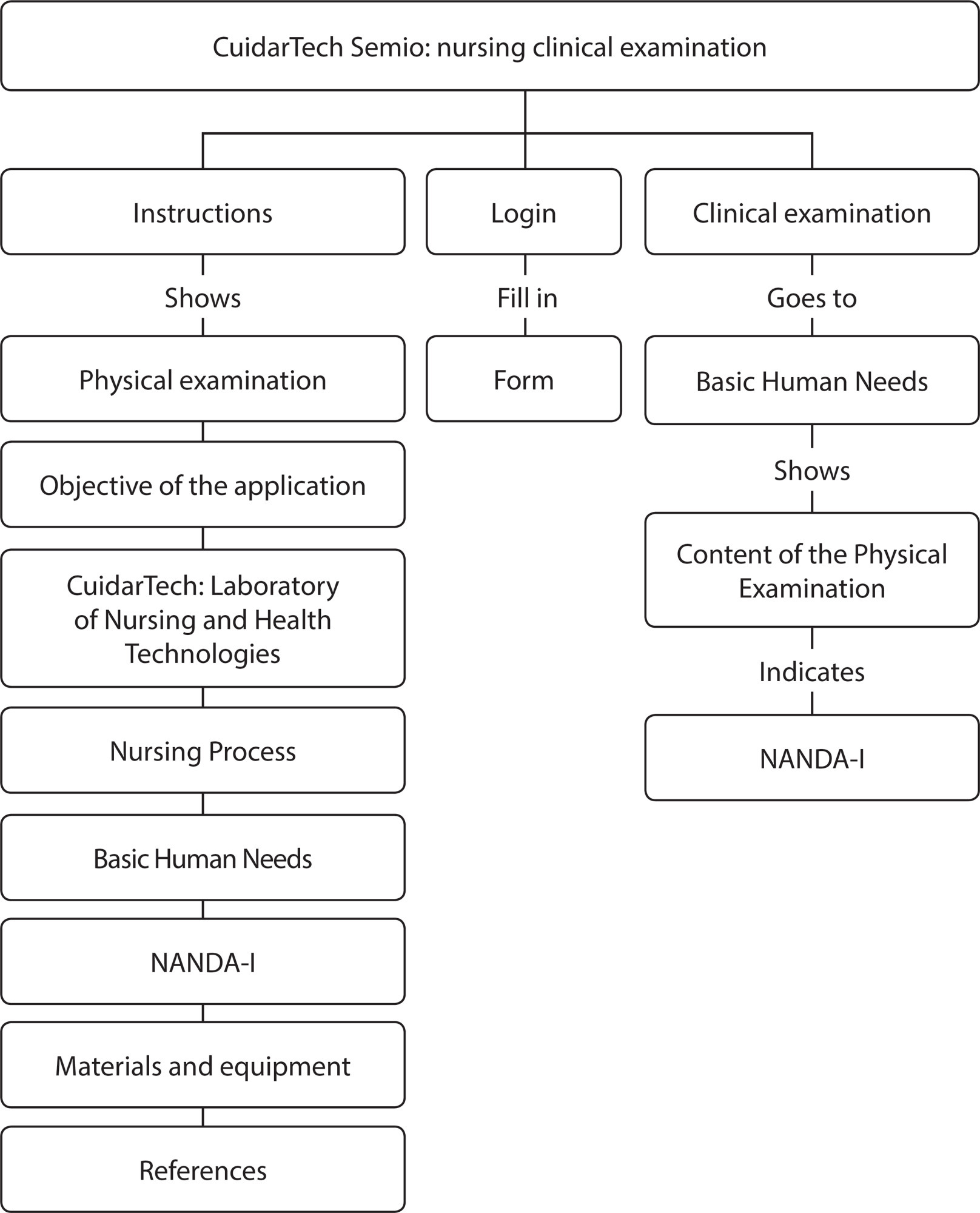
-
ORIGINAL ARTICLE10-01-2022
Factors associated with vulnerability and fragility in the elderly: a cross-sectional study
Revista Brasileira de Enfermagem. 2022;75(2):e20200399
Abstract
ORIGINAL ARTICLEFactors associated with vulnerability and fragility in the elderly: a cross-sectional study
Revista Brasileira de Enfermagem. 2022;75(2):e20200399
DOI 10.1590/0034-7167-2020-0399
Views0See moreABSTRACT
Objectives:
to assess factors associated with vulnerability and fragility in the elderly.
Methods:
crosssectional study with 384 elderly people in Fortaleza, Ceará. The Vulnerable Elders Survey and Clinical-Functional Vulnerability Index – 20 were used. Chi-square and Fisher’s exact tests were used for associations. In the analysis of the combined influence of risk factors, the stepwise logistic regression and multinomial regression methods were adopted.
Results:
251 (65.4%) non-vulnerable and 133 (34.6%) vulnerable elders. From the vulnerable elders analyzed, 42 (30.9%) are at high risk for frailty. Factors associated with vulnerability: age, gender, presence of comorbidities, hypertension, diabetes, osteoporosis and use of polypharmacy. There is a 30% increase in the chance of vulnerability for each additional drug. Physical activity reduces the chance of vulnerability by 60%. Factors associated with frailty: educational level; self-perception of health; comorbidities; polypharmacy.
Conclusions:
it is important to pay attention to the presence of arterial hypertension, osteoporosis, polypharmacy, and encourage the practice of physical activity.
-
ORIGINAL ARTICLE10-21-2019
Caring ability, burden, stress and coping of family caregivers of people in cancer treatment
Revista Brasileira de Enfermagem. 2019;72(6):1541-1546
Abstract
ORIGINAL ARTICLECaring ability, burden, stress and coping of family caregivers of people in cancer treatment
Revista Brasileira de Enfermagem. 2019;72(6):1541-1546
DOI 10.1590/0034-7167-2018-0605
Views0See moreABSTRACT
Objective:
To analyze the association between the caring ability and the burden, stress and coping of family caregivers of people in cancer treatment.
Method:
A cross-sectional study with 132 family caregivers. The following instruments were applied: a characterization instrument, the Caring Ability Inventory, the Zarit Burden Interview, the Perceived Stress Scale, and the Brief COPE. The Spearman Correlation was used with significance ≤5%.
Results:
There were significant and positive correlations between total caring ability and: burden – interpersonal relationship (p=0.03); stress (p=0.02) and maladaptive coping (p=0.00); and inversely proportional correlations with problem-focused coping (p=0.03). The courage had inversely proportional correlation with: self-efficacy (p=0.03), interpersonal relationship (p=0.00), stress (p=0.04) and maladaptive coping (p=0.00). The knowledge had significant and positive correlation with problem-focused coping (p=0.00), adaptive coping (p=0.01), and inverse correlation with stress (p=0.02).
Conclusion:
The level of caring ability correlates with levels of stress and burden, and with the type of coping strategy used by family caregivers.
-
ORIGINAL ARTICLE10-18-2022
Clinical simulation as a Nursing Fundamentals teaching method: a quasi-experimental study
Revista Brasileira de Enfermagem. 2022;75(2):e20201155
Abstract
ORIGINAL ARTICLEClinical simulation as a Nursing Fundamentals teaching method: a quasi-experimental study
Revista Brasileira de Enfermagem. 2022;75(2):e20201155
DOI 10.1590/0034-7167-2020-1155
Views0See moreABSTRACT
Objectives:
to evaluate students’ knowledge gain after the implementation of clinical simulation in Nursing Fundamentals disciplines.
Methods:
a quasi-experimental intervention was carried out with 60 students, distributed in comparison and intervention groups, who underwent traditional teaching and traditional teaching associated with simulated teaching, respectively. Pre-test and post-test instruments were applied to both groups.
Results:
after analyzing the students’ performance through the applied instruments, both groups had a cognitive evolution along with the taught content, however, when compared, the intervention group obtained a higher knowledge gain than the comparison group (p = 0.016), demonstrating progressive and increasing improvement with the use of the methodology.
Conclusions:
simulated teaching significantly helps students in gaining technical-cognitive knowledge. Therefore, it is recommended to adhere to the use of this methodology for teaching Nursing Fundamentals.
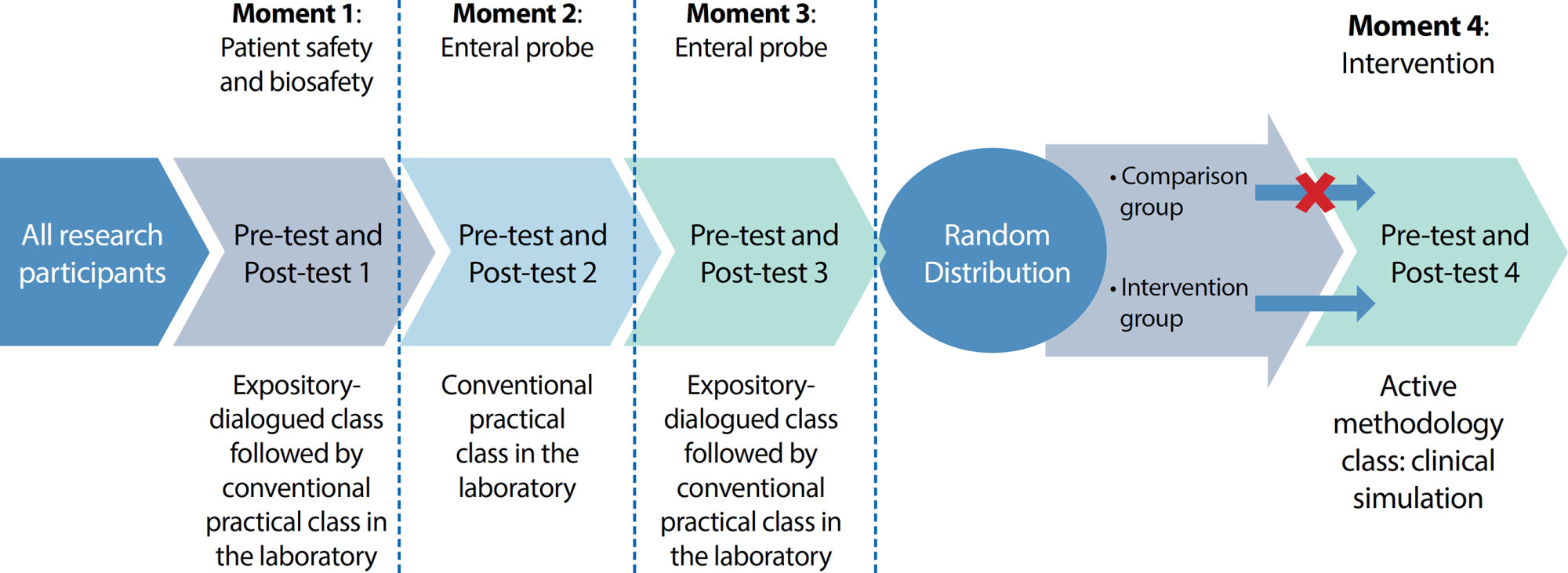
-
ORIGINAL ARTICLE08-10-2020
Eliot Freidson’s sociology of professions: an interpretation for Health and Nursing
Revista Brasileira de Enfermagem. 2020;73(6):e20180950
Abstract
ORIGINAL ARTICLEEliot Freidson’s sociology of professions: an interpretation for Health and Nursing
Revista Brasileira de Enfermagem. 2020;73(6):e20180950
DOI 10.1590/0034-7167-2018-0950
Views0See moreABSTRACT
Objectives:
to analyze theoretical conceptions of Eliot Freidson’s Sociology of Professions scoped on health and nursing professions.
Methods:
Eight nurses were interviewed, all involved in the development of the professional Council on the timeframe from 1975 to 1986. Documental resources were Laws, Ordinances, Resolutions, Reports, Meeting Minutes and Public Deeds. Information was organized as from literature and Eliot Freidson’s conceptions, and thematic content analysis was carried out.
Results:
the concepts authored by Eliot Freidson allowed for the development of a concept chart that portrays the nursing profession and that may be expanded for the other occupations in the health field, in consonance with professional organization in the country.
Final Considerations:
Eliot Freidson’s framework, in interpretation for nursing, consolidates the profession with relative autonomy, expertise by Nursing Care Systematization and credentialism by professional normalizations.
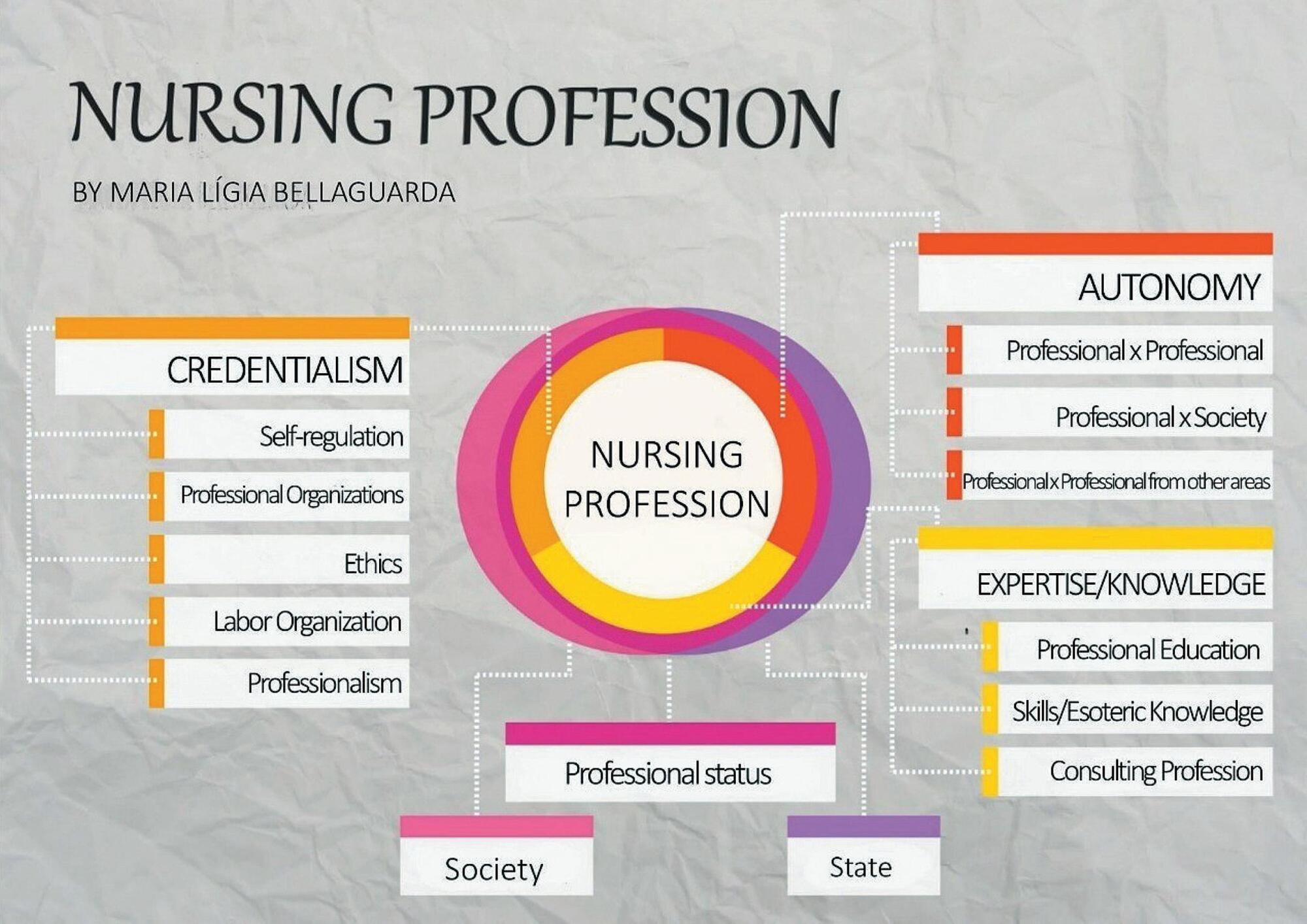
Search
Search in:
Nuvem de Tags
Aged (144) Atenção Primária à Saúde (239) COVID-19 (104) Cuidados de Enfermagem (269) Educação em Enfermagem (151) Educação em Saúde (139) Enfermagem (930) Estudos de Validação (131) Health Education (144) Idoso (208) Mental Health (149) Nursing (987) Nursing Care (306) Patient Safety (151) Primary Health Care (284) Qualidade de Vida (104) Quality of Life (106) Saúde Mental (145) Segurança do Paciente (150) Validation Studies (108)




